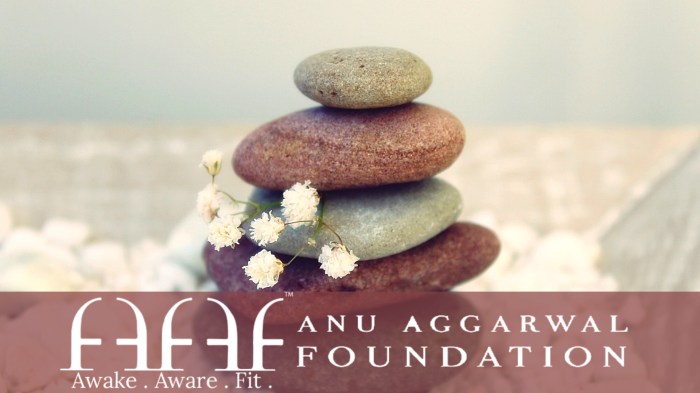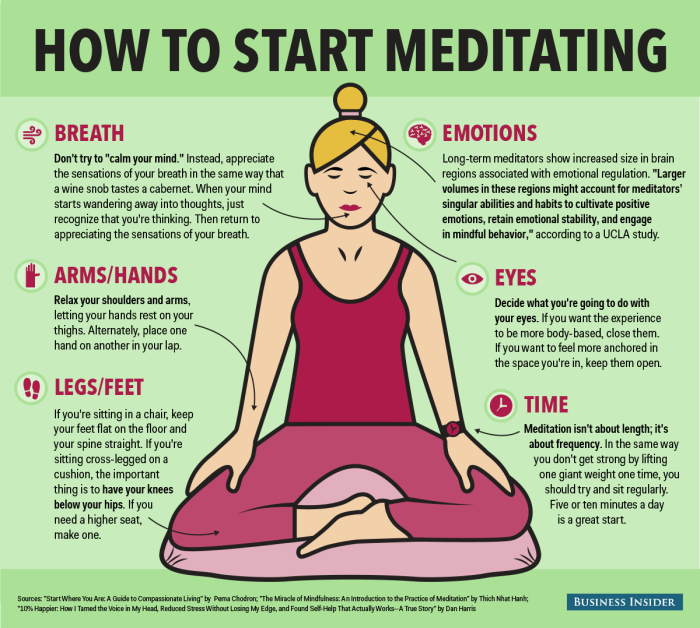How to Meditate for Enhancing Your Physical and Mental Health opens the door to a journey of self-discovery and well-being, guiding you towards a healthier mind and body.
Exploring the realms of meditation, this practice offers a path to inner peace and vitality, enriching your life in profound ways.
Introduction to Meditation

Meditation is a practice that involves focusing the mind on a particular object, thought, or activity to achieve a mentally clear and emotionally calm state. It has been used for centuries as a way to promote relaxation, mindfulness, and overall well-being.
There are various forms of meditation, but they all share the common goal of calming the mind and reducing stress. The benefits of meditation extend beyond just mental health, with numerous studies showing its positive effects on physical health as well.
For those seeking a comprehensive understanding of meditation, The Ultimate Guide to Meditation: 20 Tips and Tricks is a treasure trove of wisdom. This guide offers practical tips and tricks to enhance your meditation practice and cultivate a deeper sense of inner peace.
Benefits of Meditation for Physical and Mental Health
- Reduced stress and anxiety levels
- Improved focus and concentration
- Enhanced self-awareness and emotional well-being
- Lowered blood pressure and improved cardiovascular health
- Increased feelings of compassion and empathy
History and Cultural Significance of Meditation Practices
Meditation has roots in ancient Eastern traditions, particularly in Hinduism and Buddhism. It was initially practiced as a means to achieve spiritual enlightenment and inner peace. Over time, meditation techniques spread to various cultures and have been adapted and integrated into different belief systems and practices.
Today, meditation is widely recognized for its therapeutic benefits and is practiced by people of all backgrounds and beliefs around the world. It continues to evolve and be studied for its profound effects on both physical and mental health.
Healing from trauma can be a challenging journey, but meditation has been proven to be a powerful tool in this process. How to Meditate for Healing from Trauma provides a comprehensive guide on using meditation techniques to promote healing and emotional well-being.
Getting Started with Meditation

When starting your meditation journey, it’s important to set yourself up for success by creating a conducive environment for your practice. Here are some tips to help you get started:
Finding a Quiet and Comfortable Space
Choose a quiet and peaceful space where you won’t be disturbed during your meditation session. This could be a corner of your room, a cozy spot in your garden, or any place where you feel relaxed and at ease.
As we delve into the realm of mindfulness, one crucial aspect that often arises is how to meditate for anxiety. In our quest for inner peace, How to Meditate for Anxiety: 6 Proven Techniques offers valuable insights and practical methods to calm the mind and ease anxiety.
Sitting Posture and Breathing Techniques for Beginners, How to Meditate for Enhancing Your Physical and Mental Health
- Find a comfortable seated position, either on a cushion on the floor or a chair with your back straight and shoulders relaxed.
- Rest your hands on your lap or knees, palms facing up or down, whatever feels natural to you.
- Close your eyes gently and start focusing on your breath. Take deep, slow breaths in through your nose and out through your mouth.
- Notice the sensation of your breath as it enters and leaves your body, without trying to control it.
- If your mind starts to wander, gently bring your focus back to your breath without judgment.
The Importance of Consistency
Consistency is key when it comes to establishing a meditation routine. Aim to meditate at the same time and place each day to build a habit. Start with just a few minutes a day and gradually increase the duration as you become more comfortable with the practice.
Types of Meditation Techniques: How To Meditate For Enhancing Your Physical And Mental Health

When it comes to meditation, there are various techniques that can be practiced to achieve different benefits for your physical and mental health. Some of the most popular types of meditation include mindfulness, transcendental, and loving-kindness meditation.
As we delve into the realm of meditation, it’s crucial to explore techniques tailored for specific needs. For those grappling with anxiety, How to Meditate for Anxiety: 6 Proven Techniques offers invaluable insights. Similarly, individuals seeking healing from trauma can benefit from the profound guidance in How to Meditate for Healing from Trauma. For a comprehensive understanding, The Ultimate Guide to Meditation: 20 Tips and Tricks serves as a beacon of wisdom.
Mindfulness Meditation
Mindfulness meditation involves focusing on the present moment without judgment. Practitioners are encouraged to observe their thoughts and emotions as they come and go, without getting caught up in them. This type of meditation can help increase self-awareness, reduce stress, and improve concentration.
Transcendental Meditation
Transcendental meditation is a technique where practitioners repeat a mantra silently to achieve a state of relaxed awareness. This type of meditation aims to transcend or go beyond the thinking process to experience pure consciousness. It is known for reducing anxiety, improving creativity, and promoting overall well-being.
Loving-Kindness Meditation
Loving-kindness meditation involves cultivating feelings of love, compassion, and goodwill towards oneself and others. Practitioners typically start by directing these positive emotions towards themselves, then towards loved ones, neutral individuals, and even towards difficult people. This type of meditation can enhance empathy, reduce negative emotions, and foster a sense of connection with others.
Practicing a Simple Meditation Technique
If you are new to meditation, you can start with a simple technique like mindfulness meditation. Find a quiet and comfortable place to sit or lie down, close your eyes, and focus on your breath. Notice the sensation of each inhale and exhale, and whenever your mind wanders, gently bring your attention back to your breath. Start with just a few minutes a day and gradually increase the duration as you become more comfortable with the practice.
Meditation for Physical Health

When it comes to physical health, meditation can play a significant role in improving overall well-being. By incorporating meditation into your daily routine, you can experience a range of benefits that positively impact your physical health.
Reducing Stress and Lowering Blood Pressure
Meditation has been shown to be effective in reducing stress levels, which can have a direct impact on physical health. High levels of stress can contribute to a variety of health issues, including high blood pressure. By practicing meditation regularly, individuals can learn to manage stress more effectively, leading to lower blood pressure levels and reduced risk of heart disease.
Scientific Studies Supporting Meditation’s Benefits
- Research studies have shown that meditation can help reduce inflammation in the body, which is a common factor in many chronic health conditions.
- A study published in the Journal of the American Medical Association (JAMA) found that meditation can lead to significant reductions in blood pressure, making it a valuable tool for managing hypertension.
Specific Physical Health Conditions Benefiting from Meditation
- Anxiety Disorders: Meditation has been found to be effective in reducing symptoms of anxiety disorders, providing individuals with a natural and holistic approach to managing their condition.
- Chronic Pain: Individuals suffering from chronic pain conditions, such as arthritis or migraines, can benefit from meditation techniques that help to alleviate pain and improve overall quality of life.
- Insomnia: By incorporating meditation practices before bedtime, individuals struggling with insomnia can experience improved sleep quality and better overall health.
Meditation for Mental Health

When it comes to mental health, meditation can be a powerful tool in managing anxiety, depression, and improving overall well-being. The practice of meditation involves training the mind to focus and redirect thoughts, which can have a profound impact on mental health.
Impact of Meditation on Emotional Regulation and Stress Reduction
Meditation has been shown to be effective in enhancing emotional regulation by helping individuals become more aware of their thoughts and feelings. By practicing mindfulness and meditation techniques, individuals can learn to observe their emotions without judgment, leading to better control over their reactions and behaviors. This can be particularly beneficial for those dealing with anxiety and depression, as it provides a way to cope with difficult emotions in a healthy manner.
- Meditation helps in reducing stress levels by activating the body’s relaxation response, which can lower heart rate, blood pressure, and cortisol levels.
- Regular meditation practice can rewire the brain to respond more calmly to stressful situations, reducing the impact of stress on mental health.
- By cultivating a sense of inner peace and calm through meditation, individuals can improve their overall mental well-being and resilience to challenges.
Personal Anecdotes and Success Stories
Many individuals have shared their personal success stories of using meditation to improve their mental health. For example, a study published in the Journal of Clinical Psychology found that mindfulness meditation significantly reduced symptoms of anxiety and depression in participants. Additionally, many mental health professionals recommend meditation as a complementary therapy for managing various mental health conditions.
Embrace the transformative power of meditation as you nurture your physical and mental health, unlocking a world of peace and harmony within yourself.